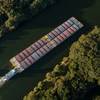USCG Marine Safety Alert
The U.S. Coast Guard issued a marine safety alert today to remind all gas carrier owners and operators to ensure that all personnel follow approved Safety Management System cargo handling procedures and industry best practices.
The USCG cited a recent investigation into a cargo compressor room fire onboard a foreign flagged Liquefied Petroleum Gas (LPG) carrier as the reason for the safety alert. Investigators suspect that unsafe cargo handling procedures associated with manual draining of hydrates from the drain line on the outlet of re-liquefaction condensers directly contributed to this casualty.
Hydrates are compounds, in the form of crystalline substances, developed from the interaction of water and hydrocarbons at certain pressures and temperatures. They are commonly present in LPG cargoes and must be safely managed throughout the cargo system. Hydrates, if not removed, can result in frozen regulating valves, clogged filters, damaged equipment, and other problems in the related cargo systems.
In the incident under investigation, the LPG being loaded was at a higher temperature than the operator desired for transit. In order to cool the LPG cargo, the gas was re-liquefied to a lower temperature by using the vessel’s boil off system. The gas was directed from the tank to a compressor, compressed to a higher pressure, and then condensed back to a liquid at a lower temperature. From the condenser it flowed back to the tank, but first passed through an expansion valve. It was reported that while this system was operating, the piping near the expansion valve began constricting flow due to hydrates freezing. This then caused an increase in system pressure from the expansion valve back via the condenser and to the outlet of the compressor.
Crewmembers reported that a ball valve at a sample point in a condenser outlet piping was opened on occasion to drain the hydrates into a modified bucket. It was also learned that flanges on the outlet piping of the ball valve had been removed and left off. Investigators were told that the Cargo Engineer regularly made rounds to manually drain the hydrates to the bucket in order to prevent the freezing of the expansion valve. However, no buckets were found and significant accumulations of ice were noted in the bilge areas below the same sample point for two of the three liquid line drains.
The USCG recommends that owners and operators ensure all shipboard personnel associated with the handling of cargo are familiar with all existing procedures to reduce casualty risks. Further, it recommends that when shipboard personnel identify cargo or safety concerns that they inform facility personnel prior to commencing loading or immediately after an issue is noted during cargo transfers.
There were other concerns identified during the investigation. The following additional concerns focus primarily on procedures that existed or were absent prior to the incident: an emergency system left in the manual mode prevented remote activation; senior organizational personnel for the operator and facility were not informed of the hydrate situations; procedures for taking actions when gas alarms sounded were not followed; and gas detection devices were not properly calibrated.
The USCG included a list of additional recommendations in the alert, which are copied below:
• Senior shore side operating company personnel provide extensive technical support when a
vessel is required to load cargo at higher temperatures and when substantial hydrates quantities
are known to be contained within;
• Shipboard Safety Management Systems and Operational Manuals be inclusive of all procedures
to be expected and performed onboard. In the incident under investigation a procedure for
removal of hydrates was unavailable;
• Such procedures, when they are developed, implemented, and performed should align with
industry best practices and all changes to the documented procedures should be vetted through
the associated parties for approval ensuring notification takes place as required;
• Routine and frequent training of shipboard officers and crew based on documented procedures
for vessels transporting dangerous cargos should take place on a regular basis and cover such
topics as;
o The safety risk of releasing LPG in open and enclosed spaces;
o Proper methods to acknowledge and investigate gas detection alarms regardless of
location; (Including making proper notifications to responsible parties)
o Ensuring that all ventilation systems are functioning as designed with no conditions
hindering its effectiveness such as open doors or obstructions;
o Methods to inspect and identify leaks throughout the cargo system, and corrective
actions to take when leaks are identified;
o Ways to manage and minimize the negative effects of hydrates throughout the entire cargo
system;
o Methods to reduce static
The USCG today also released a marine safety alert on ultra low sulfur fuel changeover procedures.














